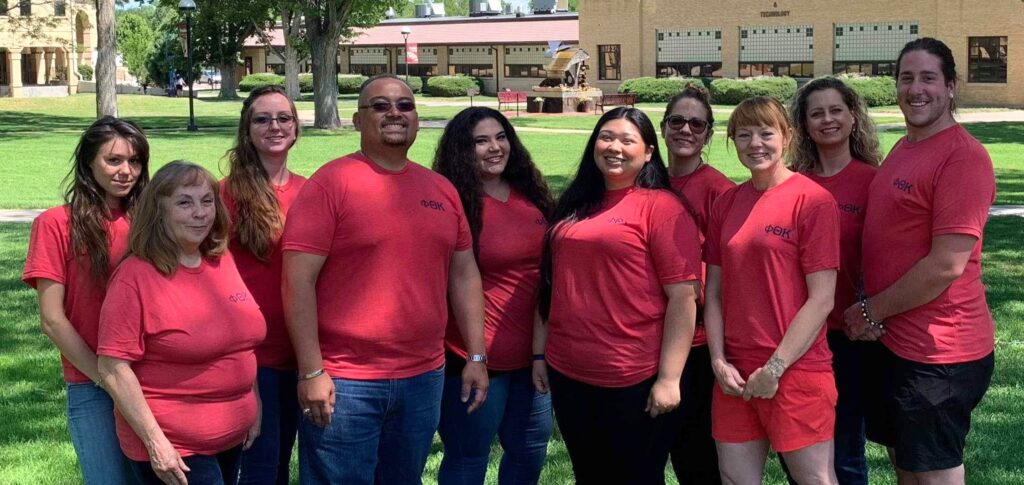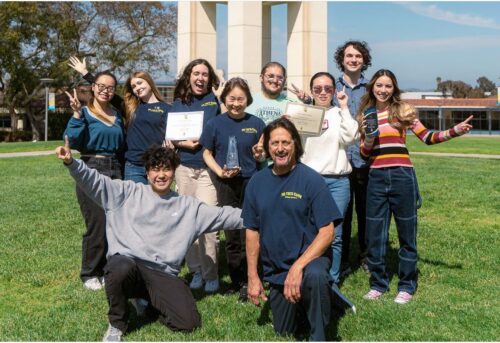Editor’s Note: We are excited to share PTK President and CEO Dr. Lynn Tincher-Ladner’s PTK Catalyst 2020 keynote address with you. You may watch it here or read the transcript below.
[embedyt] https://www.youtube.com/watch?v=iy4iJWYHhM0[/embedyt]
Our lives will forever be divided into two parts. How we viewed the world before the COVID-19 Pandemic, and how we view it now. Crisis impacts us in so many ways—and not just how we see the world, but also our belief systems, our expectations, our fears, and our hopes.
Depending on when you were born, you may remember the assassination of John F. Kennedy, the Apollo Moon Landing, 9/11, the first Google search, or the Columbine or Sandy Hook school shootings. These events impact and unify the people who are living at the time—or generations.
Generations are simply groups of people born and experiencing life at about the same time. And like people, generations form their own identities and have certain characteristics. But, before I talk about generations, it is important to note that everyone watching today is first an individual and then a member of groups. And we find wonderful diversity across and within generations.
Just as you all are, I am a product of my own generation. The America of my childhood had a growing middle class, well-defined gender roles, and polite politics. World Hunger and AIDS were the most pressing issues of our time. Coke vs Pepsi was the only war I knew. Michael Jackson was the King of Pop, the Atari video gaming system was invented.
And, although social media did not yet exist, the children in my neighborhood found ways to communicate without talking. We used cassette players to record messages to one another. After recording, we would then hop on our bikes and travel from house to house and literally throw our recorded messages on the front lawns. Depending on the message, we would speed away. Hours later, we would receive our own tape message in response. This was the social media of the late 1970s.
For a time, we were limited to rotary phones and 8-track tapes. Eventually, computers burst onto the scene and the world became smaller, as our access to each other and to information began to change. I specifically mention technology because I believe it to be a key driver of our behaviors, attitudes, and how we live and communicate—what I believe to be the secret science of how named generations were decided.
My children Lauren and Lucas have never known a life without a cell phone. Once, when they were still young enough to be in car seats, my mother called while we were driving home one day. Lauren handed the phone to her younger brother Lucas. As toddlers do, Lucas began hitting buttons at random—and accidentally disconnected the call. Lauren yelled—Mom, Lucas is logging grandma off!
And even this year, as Phi Theta Kappa turns 102, we could not experience Catalyst this way, or at all, without the technologies we have.
The children of today have inherited a much different place than the America of my childhood—a place where active shooter drills are normal. A place with less defined political and religious institutions and a shrinking middle class. The technology is fast, gender is fluid, and the climate is changing. HIV is no longer a death sentence. And while we have become more tolerant of the differences of others, we have also become a society that is more polarized than ever before.
There is greater diversity in our schools, churches, neighborhoods, and in the workplace. And when we talk about diversity, we often think about race and gender—but generational diversity is just as important to understand. For the next few minutes, I am going to share with you a little bit of what I have learned about generations and how they function in the workplace—and why it matters to you.
Baby Boomers were born between 1947 and 1965 and are currently the oldest generation you will find in the workplace. They’re current between 54-73 years old—there are almost 72 million Baby Boomers. Half are retired and the other half are working. Boomers were born in the post-war economic boom, but their parents lived through the great depression. Work ethic was a matter of life or death. The Boomers working for PTK are some of our most dependable workers.
Gen X: Gen X was born between 1966 and 1981 and are currently between 39-54 years old, and there are currently just over 65 million Gen X people in the U.S.. At work, they are independent—hate to be micromanaged. They were the first to think about work/life balance and often ask for flexible work schedules. They get their work done, but do not want to miss soccer games or school plays, like their parents did.
Gen Y, or the Millennials, were born between 1982 and 1994. They are currently between 26-38 years old—almost 60 million Millennials. They are confident, ambitious, and achievement-oriented. Millennials seek job fulfillment over pay. They work hard and are efficient and adaptable. They want a work-life balance that is tailored around the needs of each individual worker—up to and including working from home.
Generation Z was born between 1995 and 2009. They are currently between 11 and 25 years of age and are just over 65 million in U.S. and on track to be the most diverse and most educated generation ever. Gen Z are first to not know a world without cellular phones and high-speed Internet. My children are both Gen Z and their response to the world is to take action. When Michelle Obama worked to make school lunches healthier, the extra-large tasty roll was removed from my daughter’s lunch. She started a petition to get her roll back. She was 10. In my generation, “A” was for “apple,” in my daughter’s “A” is for “activist.”
Generation Alpha is predicted to be the name of the next generation. The Alpha generation will be the babies of Millennials. They are said to be the first generation that will not learn to drive. Technologies like automation, and nanotechnologies will define their behaviors.
So why does any of this matter?
Studies have shown that diverse teams outperform non-diverse teams. The reason—diverse experiences and backgrounds allow new ideas to develop. Embracing the differences of others and demonstrating care and understanding of each person is important, regardless of whether the difference is a result of race, culture, gender, or generation.
An interesting fact about community college is that you will find the first four generations I described going to school there—the same number of generations you will find in the workplace and at roughly the same proportions. The same can’t be said for a large number of four-year colleges. This means that your decision to attend a community college is preparing you for life and work in ways that you may not have expected. The diversity of community colleges is just another benefit of your choice to be there. And you are not the only ones benefiting. As institutions, community colleges are stronger because of the diversity that you bring to the classroom and the campus.
We are fortunate that community colleges are home to the most diverse group of students in higher education; and at PTK, we are even more diverse. And it isn’t just the color of your skin. It is part of our work to have you share cultural differences that arise out of age, gender, ethnicity, race, sexual orientation, and yes, even religious and political beliefs. When I look back over our year, I see evidence of this.
• We are working together and connecting communities to colleges and careers by helping underserved populations fill out the FAFSA, obtain workforce credentials and gainful employment.
• We are creating informed communities by transforming the stigma of mental health issues and helping others take charge of their own mental health.
• We are helping college leaders by researching the extent of the opioid crisis on our campuses and in our communities.
• And it isn’t just our humanitarian efforts. Our chapters are researching the impact of microplastics on the environment and our declining bee population.
Our programs like College Project and Honors in Action, by design, have you working in diverse groups in order to get things done. In the workplace, you will be surrounded by people who don’t look like you, talk like you, or think like you. Your community college experience and involvement in PTK is giving you an edge by allowing you to work in diverse groups and solve complex problems that impact your community and world.
And so, there is one more generation that I want to describe to you today—the PTK Generation.
Although you were not born within a single specific time frame, you represent the best of all of them—from Boomer to Millennial. And that is because you work together and learn from one another. Instead of surrounding yourselves with people just like you, you choose to study, lead, serve, and fellowship with this community of scholars and leaders. The result? You learn from and benefit from the amazing and diverse PTK members that you surround yourselves with.
You are dependable, hardworking, and conscientious, like the Boomers. You seek balance and value your quality of life, like Gen X. You are ambitious, confident, curious, and achievement-oriented, like the Millennials. You take action on the issues that you care about, like Gen Z. Combined, these qualities make you strong—individually and collectively.
You are the PTK Generation, and I can’t wait to watch you change the world.




